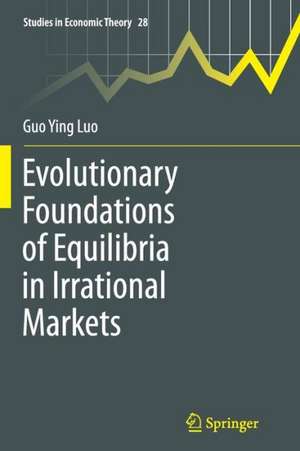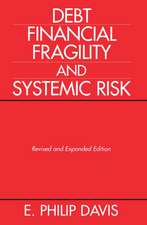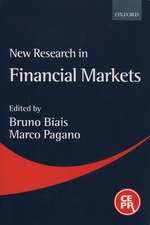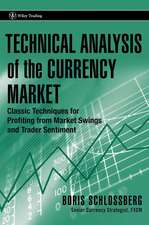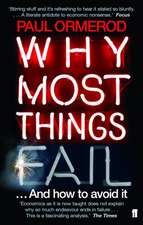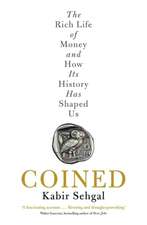Evolutionary Foundations of Equilibria in Irrational Markets: Studies in Economic Theory, cartea 28
Autor Guo Ying Luoen Limba Engleză Paperback – 25 ian 2014
Evolutionary Foundations of Equilibria in Irrational Markets proves traditional economic equilibria continue to occur despite natural selection in irrational markets. It covers a wide sampling of equilibria under various scenarios, and each chapter addresses the results of these models at an aggregate level. The text is supplemented with charts and figures to drive home key findings and proofs, making it of interest to students and researchers in the areas of economics and behavioral finance.
| Toate formatele și edițiile | Preț | Express |
|---|---|---|
| Paperback (1) | 636.30 lei 6-8 săpt. | |
| Springer – 25 ian 2014 | 636.30 lei 6-8 săpt. | |
| Hardback (1) | 641.71 lei 6-8 săpt. | |
| Springer – 18 noi 2011 | 641.71 lei 6-8 săpt. |
Din seria Studies in Economic Theory
- 18%
 Preț: 958.07 lei
Preț: 958.07 lei -
 Preț: 394.71 lei
Preț: 394.71 lei - 18%
 Preț: 952.57 lei
Preț: 952.57 lei -
 Preț: 383.93 lei
Preț: 383.93 lei - 15%
 Preț: 640.37 lei
Preț: 640.37 lei - 15%
 Preț: 645.28 lei
Preț: 645.28 lei -
 Preț: 386.39 lei
Preț: 386.39 lei -
 Preț: 394.51 lei
Preț: 394.51 lei - 18%
 Preț: 1247.26 lei
Preț: 1247.26 lei - 18%
 Preț: 1241.10 lei
Preț: 1241.10 lei - 15%
 Preț: 643.99 lei
Preț: 643.99 lei - 15%
 Preț: 644.49 lei
Preț: 644.49 lei - 15%
 Preț: 643.34 lei
Preț: 643.34 lei - 15%
 Preț: 640.88 lei
Preț: 640.88 lei - 15%
 Preț: 644.82 lei
Preț: 644.82 lei - 15%
 Preț: 645.79 lei
Preț: 645.79 lei - 18%
 Preț: 955.40 lei
Preț: 955.40 lei - 15%
 Preț: 643.00 lei
Preț: 643.00 lei - 18%
 Preț: 950.96 lei
Preț: 950.96 lei - 18%
 Preț: 1022.48 lei
Preț: 1022.48 lei - 15%
 Preț: 648.05 lei
Preț: 648.05 lei - 15%
 Preț: 641.20 lei
Preț: 641.20 lei - 15%
 Preț: 652.64 lei
Preț: 652.64 lei -
 Preț: 402.17 lei
Preț: 402.17 lei - 18%
 Preț: 954.62 lei
Preț: 954.62 lei - 15%
 Preț: 639.41 lei
Preț: 639.41 lei - 18%
 Preț: 963.15 lei
Preț: 963.15 lei
Preț: 636.30 lei
Preț vechi: 748.59 lei
-15% Nou
Puncte Express: 954
Preț estimativ în valută:
121.75€ • 127.46$ • 100.74£
121.75€ • 127.46$ • 100.74£
Carte tipărită la comandă
Livrare economică 05-19 aprilie
Preluare comenzi: 021 569.72.76
Specificații
ISBN-13: 9781489985934
ISBN-10: 148998593X
Pagini: 212
Ilustrații: XII, 200 p.
Dimensiuni: 155 x 235 x 11 mm
Greutate: 0.3 kg
Ediția:2012
Editura: Springer
Colecția Springer
Seria Studies in Economic Theory
Locul publicării:New York, NY, United States
ISBN-10: 148998593X
Pagini: 212
Ilustrații: XII, 200 p.
Dimensiuni: 155 x 235 x 11 mm
Greutate: 0.3 kg
Ediția:2012
Editura: Springer
Colecția Springer
Seria Studies in Economic Theory
Locul publicării:New York, NY, United States
Public țintă
ResearchCuprins
1. Evolution, Irrationality and Perfectly Competitive Equilibrium.- 2. Evolution, Irrationality and Monopolistically Competitive Equilibrium.- 3. Evolution and Informationally Efficient Equilibrium in a Commodity Futures Market.- 4. Natural Selection, Random Shocks and Market Efficiency in a Futures Market.- 5. Evolution, Noise Traders and Market Efficiency in a One-Sided Auction Market.- 6. The Evolution of Money as a Medium of Exchange in a Primitive Economy.- 7. Conclusion.
Recenzii
From the reviews:
“This is a very interesting book, to mathematical economists and applied probabilists … . Furthermore, since this is an area that is still open to further developments, this book may be an excellent starting point for further research. The book is well written, and balances the material extremely well, so that it can be read by a wide audience. The references also help the reader who wishes to get into more detail on the wide (not mathematical) literature on the subject.” (Athanasios Yannacopoulos, Mathematical Reviews, January, 2013)
“This is a very interesting book, to mathematical economists and applied probabilists … . Furthermore, since this is an area that is still open to further developments, this book may be an excellent starting point for further research. The book is well written, and balances the material extremely well, so that it can be read by a wide audience. The references also help the reader who wishes to get into more detail on the wide (not mathematical) literature on the subject.” (Athanasios Yannacopoulos, Mathematical Reviews, January, 2013)
Textul de pe ultima copertă
One of the core building blocks of traditional economic theory is the concept of equilibrium, a state of the world in which economic forces are balanced and in the absence of external influences the values of economic variables remain static. Many traditional equilibrium models, or equilibria, are established based on the rational behavior of individuals within financial markets, such as traders, market analysts, and investing firms, and their ability to maximize profits, no matter the cost. Yet what happens when these market participants behave in an irrational manner, and how does this impact economic equilibria? Contemporary economists have agreed that a process similar to Darwin’s Theory of Natural Selection takes over, whereby equilibria are shaped not by the behavior of individual participants but by an environment outside its control (i.e., an environment with little concern for maximizing profits). It is an environment in which those “selected” produce positive financial gains, but have no regard for how it was obtained or underlying motivations—and those participants suffering losses disappear altogether.
Evolutionary Foundations of Equilibria in Irrational Markets proves traditional economic equilibria continue to occur despite natural selection in irrational markets. It covers a wide sampling of equilibria under various scenarios, and each chapter addresses the results of these models at an aggregate level. The text is supplemented with charts and figures to drive home key findings and proofs, making it of interest to students and researchers in the areas of economics and behavioral finance.
Evolutionary Foundations of Equilibria in Irrational Markets proves traditional economic equilibria continue to occur despite natural selection in irrational markets. It covers a wide sampling of equilibria under various scenarios, and each chapter addresses the results of these models at an aggregate level. The text is supplemented with charts and figures to drive home key findings and proofs, making it of interest to students and researchers in the areas of economics and behavioral finance.
Caracteristici
First comprehensive text on equilibrium outcomes through economic natural selection in irrational markets Covers several new evolutionary models of future markets, commodities, and one-sided auctions First book to survey equilibrium outcomes at an aggregate level
